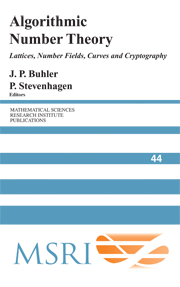Book contents
- Frontmatter
- Contents
- Preface
- Solving the Pell equation
- Basic algorithms in number theory
- Smooth numbers and the quadratic sieve
- The number field sieve
- Four primality testing algorithms
- Lattices
- Elliptic curves
- The arithmetic of number rings
- Smooth numbers: computational number theory and beyond
- Fast multiplication and its applications
- Elementary thoughts on discrete logarithms
- The impact of the number field sieve on the discrete logarithm problem in finite fields
- Reducing lattice bases to find small-height values of univariate polynomials
- Computing Arakelov class groups
- Computational class field theory
- Protecting communications against forgery
- Algorithmic theory of zeta functions over finite fields
- Counting points onvarieties over finite fields of small characteristic
- Congruent number problems and their variants
- An introduction to computing modular forms using modular symbols
The arithmetic of number rings
Published online by Cambridge University Press: 30 May 2025
- Frontmatter
- Contents
- Preface
- Solving the Pell equation
- Basic algorithms in number theory
- Smooth numbers and the quadratic sieve
- The number field sieve
- Four primality testing algorithms
- Lattices
- Elliptic curves
- The arithmetic of number rings
- Smooth numbers: computational number theory and beyond
- Fast multiplication and its applications
- Elementary thoughts on discrete logarithms
- The impact of the number field sieve on the discrete logarithm problem in finite fields
- Reducing lattice bases to find small-height values of univariate polynomials
- Computing Arakelov class groups
- Computational class field theory
- Protecting communications against forgery
- Algorithmic theory of zeta functions over finite fields
- Counting points onvarieties over finite fields of small characteristic
- Congruent number problems and their variants
- An introduction to computing modular forms using modular symbols
Summary
We describe the main structural results on number rings, that is, integral domains for which the field of fractions is a number field. Whenever possible, we avoid the algorithmically undesirable hypothesis that the number ring in question is integrally closed.
The ring ℤ of ‘ordinary’ integers lies at the very root of number theory, and when studying its properties, the concept of divisibilityof integers naturally leads to basic notions as primality and congruences. By the ‘fundamental theorem of arithmetic’, ℤ admits unique prime factor decompositionof nonzero integers. Though one may be inclined to take this theorem for granted, its proof is not completely trivial: it usually employs the Euclidean algorithm to show that the prime numbers, which are defined as irreducibleelements having only ‘trivial’ divisors, are prime elementsthat only divide a product of integers if they divide one of the factors.
Information
- Type
- Chapter
- Information
- Algorithmic Number TheoryLattices, Number Fields, Curves and Cryptography, pp. 209 - 266Publisher: Cambridge University PressPrint publication year: 2008
Accessibility standard: Unknown
Why this information is here
This section outlines the accessibility features of this content - including support for screen readers, full keyboard navigation and high-contrast display options. This may not be relevant for you.Accessibility Information
- 1
- Cited by
